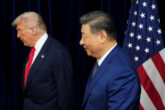October 24, 2022
Democracies Must Stop Playing Games with Myanmar’s Representation at the United Nations
During last month’s high level session of the 77th United Nations General Assembly (UNGA), nearly 700 global civil society organizations sent a scathing letter to United Nations Secretary General Antonio Guterres demanding that the U.N. and its organs stop legitimizing the military junta that seized power in Myanmar in a February 2021 coup. This letter was the latest salvo in the long-running battle over the conflict-ridden country’s representation in the U.N. system. Since the coup that deposed Myanmar’s democratically elected government, the U.N. has attempted—with predictably poor results—to navigate the diplomatic minefield of Myanmar’s representation. This failure is largely due to the corrupt bargain that U.N. leaders and Member States, many of which cast themselves as the guardians of human rights and the rules-based order, have cut, dishonoring the principles they publicly support.
Shortly after the coup, Ambassador Kyaw Moe Tun, Myanmar’s sitting permanent representative (PR) to the UNGA in New York, pledged his loyalty to the democratic forces, now organized under the rubric of the National Unity Government (NUG). While he continues to formally occupy Myanmar’s seat in New York since the fall of 2021, Kyaw Moe Tun has been denied the normal rights and responsibilities of that position through the informal collusion of certain powerful countries on the U.N.’s credentials committee.
Member States that believe in human rights and democracy must take the necessary steps to give back to the Burmese people — from whom so much has been taken — their voice.
It is no mystery why Russia and China, themselves authoritarian countries and allies of the military junta, prefer to hold Kyaw Moe Tun in check and muddy the waters around Myanmar’s representation. Both continue to provide the junta with political and economic lifelines, including through weapons sales, and have shamelessly blocked Security Council action on Myanmar for decades. What is more puzzling, however, is why democratic countries such as the United States and U.N. leaders such as Secretary General Guterres have gone along with this travesty. As the credentials committee adjudicates this matter for the UNGA’s 77th session, the democratic Member States that sit on the committee and in the UNGA must do better and give the Burmese people the voice and representation they deserve.
Read the full article from Just Security.
More from CNAS
-
Chinese Maker of Bitcoin-Mining Machines Is a Security Threat, Says Expert
Bloomberg News reports that a Chinese manufacturer, Bitmain Technologies Ltd, that sells most of the world’s Bitcoin-mining machines — including 16,000 of them to a venture ba...
By David Feith
-
Indo-Pacific Security / Energy, Economics & Security
North Korea’s Provocations, Power Plays, and Shifting AlliancesTensions on the Korean Peninsula have reached a new and dangerous threshold. President Lee Jae Myung is warning of a real risk of accidental military clashes, as the situation...
By Dr. Go Myong-Hyun
-
Indo-Pacific Security / Energy, Economics & Security
How to Win the Economic War with ChinaTrump's approach to China has run aground, giving Beijing unprecedented advantage in the economic conflict....
By Edward Fishman & Julian Gewirtz
-
Indo-Pacific Security / Technology & National Security
Sharper: Tech + ChinaRecent talks between President Donald Trump and Chinese Communist Party General Secretary Xi Jinping placed a spotlight on emerging technologies, from high-end chips to minera...
By Charles Horn & Sevi Silvia




